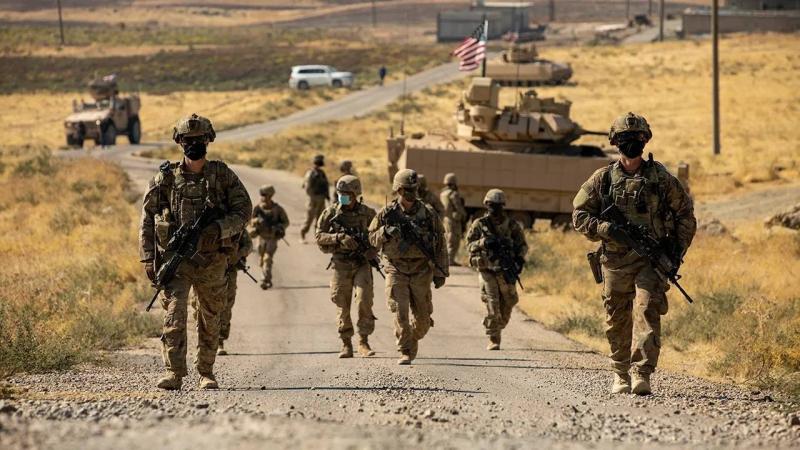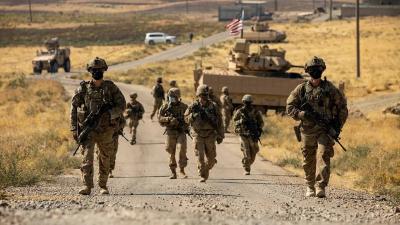Amid the prospects of regional escalation that may put their lives at greater risk, the American newspaper "The Hill" has called for the withdrawal of small American forces stationed openly in Iraq and Syria, drawing parallels to what former President Ronald Reagan did when he withdrew American troops from Beirut after hundreds were killed in the bombing of their military headquarters, relocating them from the land to ships at sea. The report stated that American security interests are best served when the U.S. military is able to apply decisive power by initiating operations at the time and place of its choosing, noting that soldiers deployed in Iraq and Syria cannot engage in a "just battle." It urged the application of "common sense" rather than exposing the small number of troops stationed in remote and open bases to gunfire from Iranian-backed factions.
After mentioning the occurrence of over 73 attacks on American forces in Iraq and Syria in recent weeks, resulting in injuries to more than 60, and their survival from a drone strike that targeted one of their bases in Iraq without detonation, the report stated that the purpose of these attacks was not to threaten or inconvenience American military personnel but to kill them. While highlighting the retaliatory airstrikes carried out by the United States against factions in response to those attacks, it affirmed that the U.S. must retain the right to respond forcefully when American forces are at risk. However, it warned that such operations would not prevent more attacks on American vulnerabilities; rather, they could increase the scale and pace of these assaults.
The report observed that "many Americans will be puzzled when they realize that about 2,500 American soldiers are still in Iraq and 900 others are still stationed in Syria," adding that their presence is part of the remnants of the mission to combat ISIS, which technically ended with the regional defeat of the so-called "caliphate" in Iraq in 2017 and in Syria in 2019. It continued that American forces are currently deployed throughout Iraq and are stationed at the Al-Tanf base in Syria, ostensibly on a mission to advise and assist local forces working to ensure the "permanent defeat" of the terrorist organization.
However, the report argued that the strength of the U.S. military is successful when its mission is clear, resources are deployed thoughtfully, and there is a strong commitment to achieving victory through robust civil engagement and Congressional involvement. It added that when armed forces are neglected and there is not a strong and clear commitment to achieving victory, American soldiers and their allies are put at risk.
On the recent 40th anniversary of the bombing of U.S. Marine Corps facilities in Beirut, when a suicide bomber detonated a truck bomb that resulted in the deaths of 241 American soldiers, the report noted that the mission of American forces back then was not clearly defined, as they were bound by peacetime rules of engagement to maintain a "neutral status," while exposed to sniper fire and mortar shells from the moment they were landed from the sea to the shore.
The report praised President Reagan's stance at the time when he repositioned the Marines on naval ships, quietly withdrawing soldiers from a bloody, multi-faceted civil war, correcting the course and saving more American lives and resources, describing what Reagan did as exhibiting strategic awareness and political steadfastness in his decision to rescue American soldiers from unnecessary danger.
For this reason, the report stated, "Let us learn from this lesson. It is time now to regain the initiative and deprive our adversaries of their objective by withdrawing our forces from Iraq and Syria," adding that "whatever orders are purportedly justifying their missions must be weighed against the reality that, in the event of severe harm to them, a broader regional war may become unavoidable," warning that "such a conflict would not serve American and Israeli interests."
It continued by mentioning the deployment of U.S. carrier groups "Eisenhower" and "Ford," along with the Ohio-class nuclear submarine armed with 154 Tomahawk cruise missiles, among other warships in the region, which serve as undeniable proof of America's ability to demonstrate overwhelming power, defend U.S. interests, and assist allies.
The report concluded by reminding that American soldiers are located in vulnerable and isolated bases in Iraq and Syria, exposed to gunfire, remaining there since before the current crisis, while their deployment lacks immediate targeted goals, restricting their freedom to operate. It emphasized that the American military should be deployed to fight and achieve victory, not to be "bait in a trap of our making." Therefore, it called upon policymakers in Washington to "have the necessary courage to develop their mindset, leverage strengths, and avoid unnecessary disasters."




